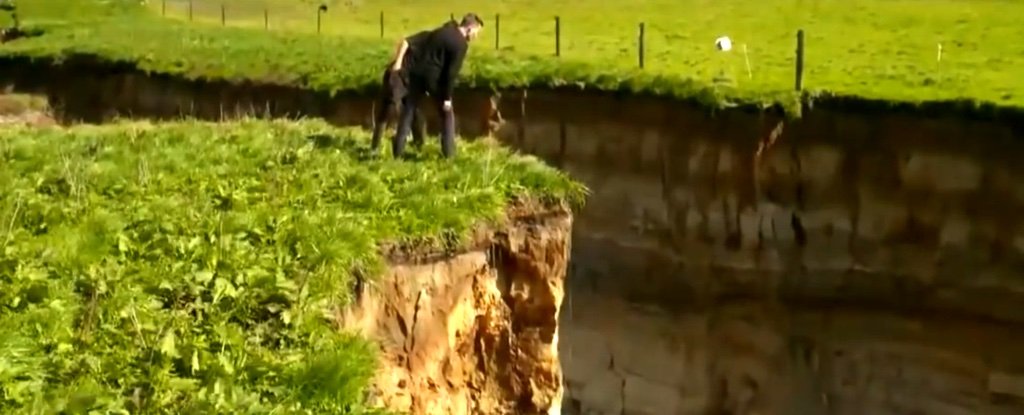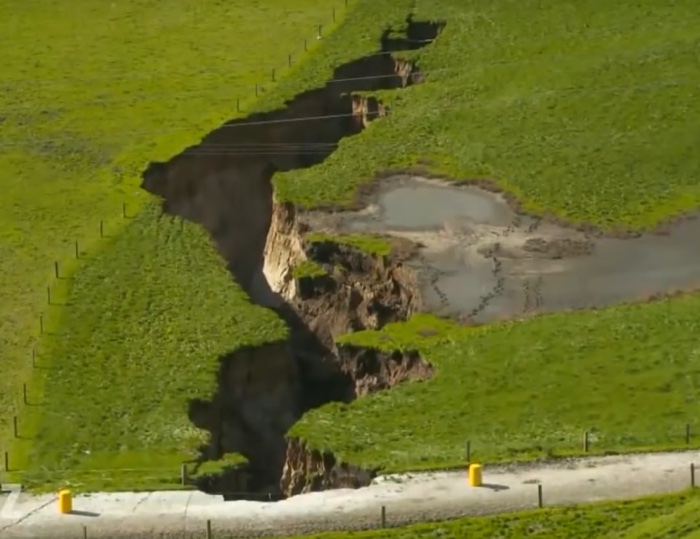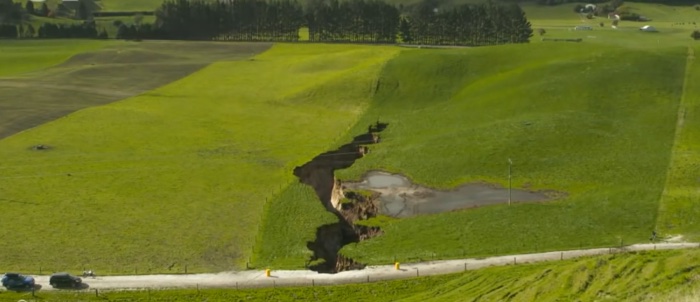'Biggest
Ever' Sinkhole Ripped Open in New Zealand, And Unearthed History
PETER
DOCKRILL

16
December, 2018
What
is thought to be the largest known sinkhole in New Zealand ripped
open across a farm on NZ's North Island earlier this year, revealing
a gigantic cavernous void estimated to have been decades or even a
century in the making.
As
of May 2018, the sinkhole
, situated about 15 kilometres south-east of
the city of Rotorua in a region called Earthquake Flat, measured as
long as two football fields and plunges to a depth that would swallow
a six-storey building.
"The
largest I've seen prior to this would be about a third of the size of
this, so this is really big," volcanologist Brad Scott from Kiwi
geoscience firm GNS Science told AP at the time.

A
farm assistant first came across the sinkhole in early May before the
sun came up, narrowly avoiding riding into it on his motorbike when
rounding up cows for milking early in the morning.
Only
later in the day, when visibility was improved, did the sheer scale
of the gaping chasm become apparent.
RAW VIDEO: See the massive sinkhole — six stories deep, two football fields long — that opened underneath a New Zealand farm. A volcanologist says it may have been growing underground for up to 100 years before recent heavy rain opened it up. cbsloc.al/2Idx4Tu
"It
wasn't until I came down in daylight that I actually saw just how big
it was," said farm manager Colin Tremain.
"We'll
keep it fenced off as it is to keep stock out, although stock aren't
stupid, they're not going to walk into a hole, they can spot danger."
According
to Scott, the sinkhole could have been forming for up to 100 years,
after decades of rainfall slowly eroded the farm's limestone rock
foundations.
After
a period of intensive rainfall at the end of April that lasted for
about a week, the last of the rock's resistance gave way, opening up
to reveal this jagged, 200-metre-long (656 ft) ravine that looks like
something out of the movie 2012.
The
20-metre (66 ft) depth of the hole isn't just vertigo-inducing. It
also offers a fascinating scientific cross-section to geologists,
showing the gradual build-up and layering of rock, sediment, and soil
over unimaginably long timescales.
"What
I see in the bottom of this hole is the original 60,000-year-old
volcanic deposit that came out of this crater," Scott told TVNZ.
"Then
there's a stack of about 10 to 12 metres of sediment sitting on top
of it from lakes that have formed in this crater. The top three
metres is volcanic ash."

What
makes this sinkhole so much bigger than ones that have preceded it in
New Zealand is the record-breaking rainfall that helped cause it –
almost 170mm of rain in 38 hours.
Thanks
to that decisive deluge, volcanologists and landslide scientists will
be busy over the next few weeks, inspecting the chasm, and seeing
what they can learn from it.
Others
meanwhile, are just happy this giant void didn't swallow them whole –
like the farm assistant, Gabriel Lafalla, who narrowly avoided riding
into the sinkhole in the pre-dawn darkness.
"I
could have died," he told Stuff.
"I
touched myself [the sign of the cross] and said to myself, 'I'm
alive'."





No comments:
Post a Comment
Note: only a member of this blog may post a comment.